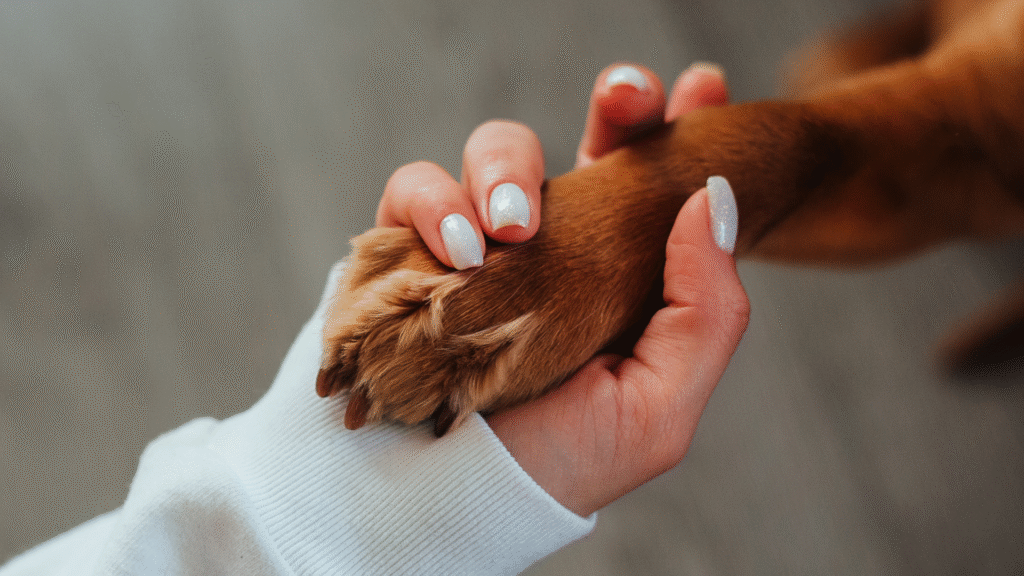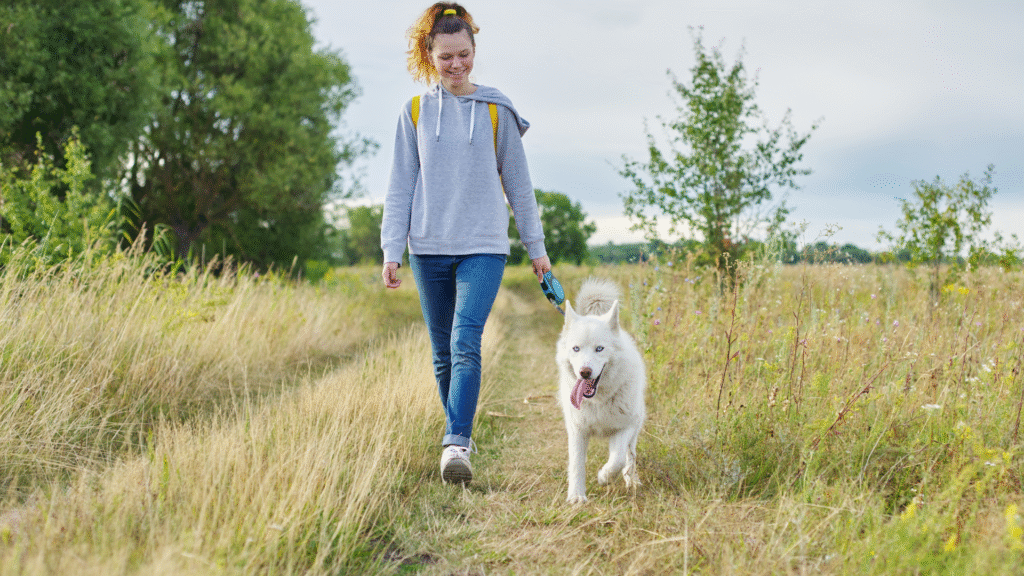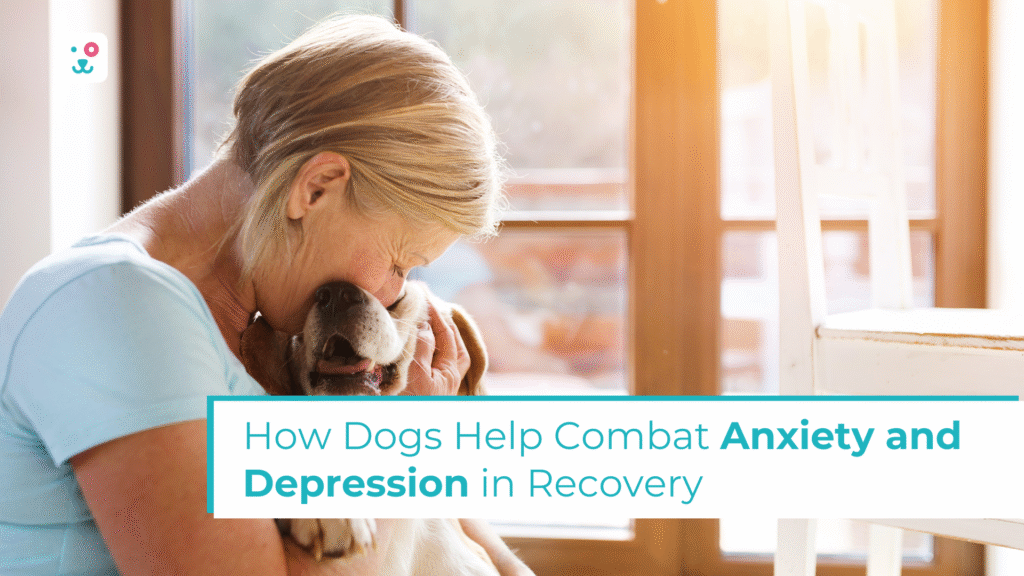The road to recovery—whether from addiction, trauma, or mental health struggles—is often paved with intense emotional highs and lows. For many, anxiety and depression are persistent shadows that don’t vanish overnight, even when the physical symptoms of withdrawal or crisis have faded. While therapy, medication, and support groups are vital pieces of the healing puzzle, there’s another powerful ally walking quietly beside many people in recovery: dogs for anxiety and depression recovery. Their presence is more than comforting—it’s transformative. Let’s explore how dogs helps in anxiety and depression recovery and why their support goes beyond simple companionship.
1. They Create a Calming Presence
Anxiety can feel like a relentless storm—racing thoughts, rapid heartbeat, shallow breathing. Dogs help soothe this storm through their calm, grounded energy. Their rhythmic breathing, soft fur, and unconditional presence can bring someone back to the moment in ways words or medication often can’t.
Scientific evidence backs this up: interacting with dogs for anxiety and depression recovery has been shown to reduce cortisol (the stress hormone) and increase oxytocin (the bonding hormone), leading to decreased anxiety and improved emotional regulation.

2. They Interrupt Negative Thought Patterns
Depression often brings with it a cycle of rumination and self-criticism. When you’re caught in your head, a dog can break through the noise.
A nudge on your leg.
A lick on your hand.
A playful bark reminding you it’s time for a walk.
These small interactions create distractions that are grounding and external, helping people shift focus away from internal pain and back to the present.
3. They Instill Purpose and Routine
One of the most debilitating symptoms of depression is the lack of motivation to do even the simplest tasks. Having a dog introduces non-negotiable responsibilities—feeding, walking, grooming, and cuddling—that give structure to the day.
This sense of purpose can be life-changing for someone in recovery. It shifts the mindset from “What’s the point?” to “My dog needs me.” In that responsibility, people often rediscover their self-worth and the capacity to care again.
4. They Provide Unconditional Love—No Judgment
Many people in recovery carry the heavy burden of shame, guilt, and regret. In a world that may judge or question them, dogs offer a love that is pure and without condition.
A dog doesn’t care about your past.
They don’t care how many mistakes you’ve made or how many times you’ve stumbled.
They see you—right now—and they love you for it.
This kind of acceptance is deeply healing and helps reinforce the belief that recovery is worth the fight.
5. They Get You Outside (and That Matters)
Depression can make it difficult to leave the house. But dogs don’t let you isolate indefinitely. They need to go out, and that gentle push often helps individuals re-engage with the world.
Walking a dog not only provides physical exercise (a natural mood booster), but also increases exposure to sunlight, improves sleep quality, and encourages social interaction, even if it’s just a smile or hello from another dog owner. These small moments add up and slowly chip away at the walls depression builds.

6. They’re Present During the Tough Moments
Recovery isn’t linear. There are relapses, panic attacks, dark nights of the soul. In those moments, dogs don’t try to fix you—they simply stay. And that matters more than we give them credit for.
Whether someone is battling cravings, crying on the floor, or facing a depressive episode, a dog’s ability to just be present provides emotional security that’s rare and incredibly grounding.
7. They Build Emotional Intelligence and Empathy
Caring for a dog requires you to tune into their needs, moods, and non-verbal cues. Over time, this enhances emotional awareness, patience, and compassion—qualities that are often damaged or numbed by prolonged substance use or mental health disorders.
In learning to care for a dog, people often learn to better care for themselves—and even begin rebuilding healthy relationships with others.
Real-Life Stories: Healing with a Four-Legged Companion
- Samantha, a recovering opioid user, credits her Labrador Retriever with keeping her clean. “He gave me a reason to get out of bed. When I didn’t want to live for myself, I lived for him.”
- Derek, living with PTSD and alcoholism, found comfort in his rescue dog. “When I had a panic attack, she’d crawl into my lap and wouldn’t leave. That presence was everything.”
- Tina, recovering from depression, said, “My dog saw the best in me when I couldn’t. That’s what helped me start believing I had a future again.”
Not All Heroes Wear Capes—Some Just Wag Their Tails
In recovery, there is no magic fix. But dogs offer something close to it: a consistent, loving presence that eases anxiety, softens depression, and reminds people they’re not alone.
Whether through laughter during play, a walk that clears the head, or the simple comfort of a warm body curled beside them, dogs help light the path forward. For many, they’re not just pets—they’re emotional anchors, silent therapists, and faithful companions on the journey to healing.
Final Thoughts dogs for anxiety and depression recovery
If you or someone you love is navigating recovery and battling anxiety or depression, consider the unique and powerful support a dog can offer. Whether it’s adopting, fostering, or engaging in animal-assisted therapy, the bond between human and dogs for anxiety and depression recovery has the potential to transform pain into purpose—and despair into hope.
Would you like a follow-up article on the best dog breeds for emotional support during recovery or how to incorporate dogs into structured mental health treatment?

